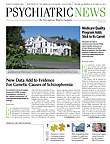We could not agree more with the article “Knowledge of Military Life Facilitates Vets’ MH Care” in the August 2 issue.
Most civilian psychiatrists have little knowledge of military jargon and culture. Phrases and words like being “down range” (deployed to Southwest Asia) and being around “TPNs,” or third-party nationals often contracted to conduct day-to-day maintenance, could be misinterpreted or affect the conduct of the clinical interview. The identification of stressful events other than the obvious combat exposure can sometimes hinge around the knowledge of combat-zone deployment activities other than the usual easily identified firefights and improvised explosive device concussive blast or shrapnel exposure. The conflicts in both Iraq and Afghanistan have required that soldiers be embedded with local national security forces for recruitment, training, and mission completion. These forces can sometimes be infiltrated by enemy combatants. These account for the so-called “green on blue” attacks that can heighten soldiers’ experience of constant tension and fear, which can result in nonacute trauma but nevertheless can cause an increase in vigilance and anxiety.
As your article mentions, soldiers often are reluctant to come forward with emotional complaints. The reasons for this vary. Noncommissioned officers are reluctant to volunteer symptoms that would render them “profiled” (limit their ability to either carry or fire a weapon), even if temporary. Most fear not being promoted and/or losing their military careers. Others prefer to “lock it down”: this usually means a soldier’s voluntary repression of thoughts and/or symptoms of a traumatic event. This term is somewhat akin to what we could call “resilience” and could be utilized to shore up resources to adapt and tolerate stressful situations in the military or veteran patient.
Administrative jargon may call into question a soldier’s deployment activity. A DD 2214 may say that the soldier was in Kuwait, reflecting only the soldier’s theater entry. This could make a Posttraumatic Stress Disorder Clinical Team suspicious about a history of combat-zone exposure. Service members’ activities may not always reflect their “military occupation specialty,” since service members are frequently cross-trained or assigned or volunteer to others.
Posttraumatic stress disorder (PTSD) and mood disorders are the most frequent diagnoses among soldiers. PTSD is the most common, present among both combat arms (31 percent) and noncombat arms (20 percent) of combat zone–deployed soldiers. Among noncombat zone–deployed soldiers, mood disorders are the most frequent diagnosis equally present, in about 4 percent of both combat and noncombat arms soldiers.
Community and faculty psychiatrists should learn and teach residents some of the cultural nuances and parlance of military personnel, especially in those states that have a large military presence, such as Virginia, North Carolina, Texas, and California.
J. Edwin Nieves, M.D.Yorktown, Va.
K. M. Stack, M.D.Yorktown, Va. ■
